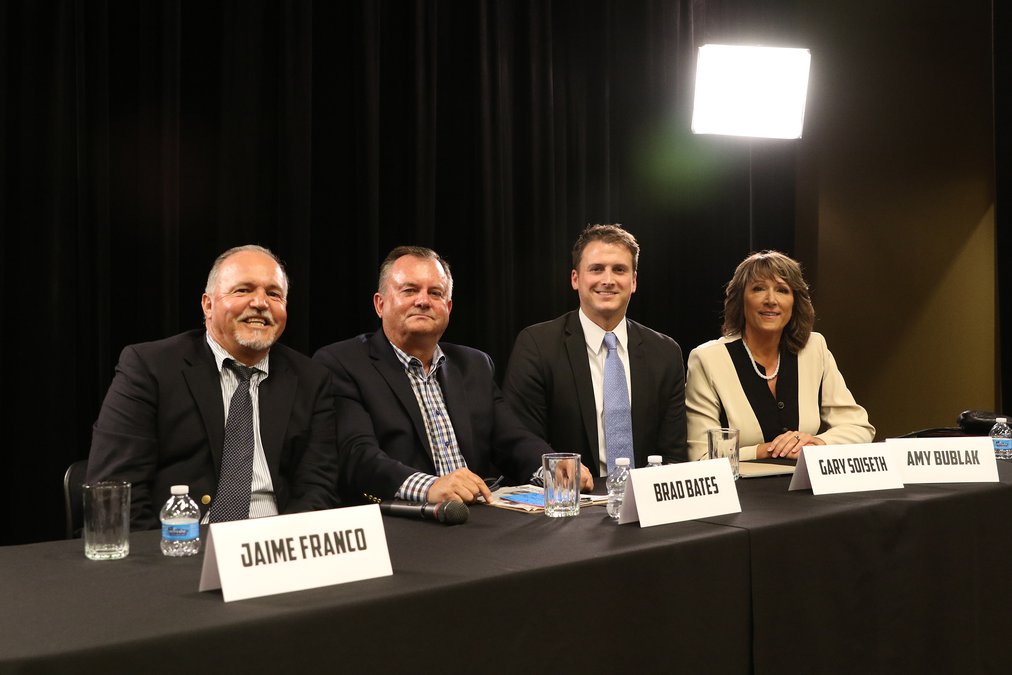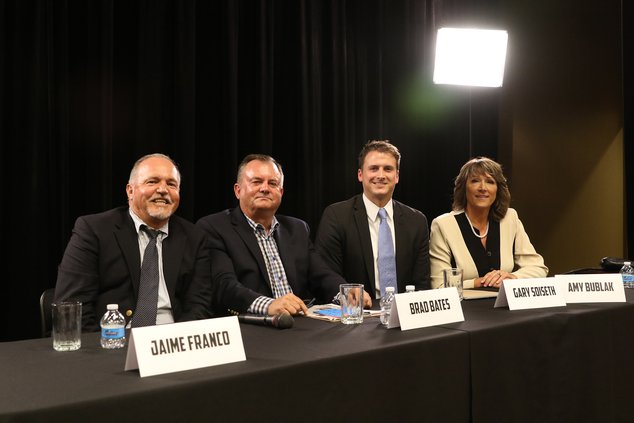The four candidates hoping to be elected as Turlock’s next mayor shared their views on water, budget, roads and more Thursday night during the Turlock Journal’s Mayoral Candidate Forum, challenging each other’s assertions along the way in what has grown to be a competitive race.
The forum brought together current Mayor Gary Soiseth and his challengers — City Councilmember Amy Bublak, former City Council candidate Jaime Franco and former mayor Brad Bates — for the opportunity to share with the Turlock community their vision for the city if elected.
Water was one of the primary focuses of the discussion, and as one of the most critical issues facing both Turlock and the state, each candidate had plenty to say.
In December, the Turlock City Council approved a water rate increase that will see customers’ bills almost double over the next five years.
The rate increase was presented to the public as a way to fund treatments needed for the City’s current groundwater wells and to help fund a new surface water treatment plant. Currently, 100 percent of the City of Turlock’s drinking water supply comes from groundwater. However, the drinking water supply is declining, contaminant levels are increasing and groundwater quality regulations have become more stringent.
The City of Turlock recently participated in a groundbreaking ceremony for the Stanislaus Regional Water Authority’s surface water treatment plant project in Hughson. The plant is expected to deliver treated Tuolumne River water to Turlock homes by 2022.
Soiseth was forced to defend his support of bringing a water treatment facility to the area, with Bates stating the decision was made hastily, affecting local water distribution and property value, and Bublak questioning whether or not Turlock residents would truly benefit from the project that was doubling their water rates.
“This was the number one thing I ran on and tackled when I came in,” Soiseth said. “Rates are going to double...but rates were going to go up 63 percent if we stayed on groundwater.”
Franco stated that conservation is key when it comes to the future of Turlock’s water.
Another hot topic throughout the course of Turlock’s mayoral campaign has been the city’s finances.
For the 2017-18 fiscal year, the City of Turlock is projected to have a fund deficit of $1.3 million. For the 2018-19 fiscal year, the deficit spending is projected to be at $3.2 million, leaving a General Fund Reserve balance under the $6.5 million threshold mandated for the City to maintain by a previous resolution.
The City of Turlock’s sales tax revenue has also continued to steadily decline for nine consecutive months. The City’s Sales Tax Update for the first quarter of 2018 shows that $3,099,111 was collected in sales tax revenue, which is a 4.3 percent decrease from the same time period last year.
When asked their plan to secure Turlock’s economic future, both once again attacked Soiseth’s leadership and pointed to his decisions as the cause of future financial problems for the city.
Bublak stated that the City of Turlock’s finance director told her Turlock’s federal reserve could be exhausted by 2021, and Bates accused the Mayor of being “disingenuous” when he described the state of the city as “strong” in July.
“We have been under the illusion that things are okay,” Bates said, pointing to the dropping sales tax revenue in the city. “We could be facing a perfect storm.”
Soiseth said that the reason the City is currently in deficit spending is due to necessary public safety spending, including a new radio system and several new positions for fire and police, and from paying down the City’s contribution to the Public Employee Retirement System.
“These are not frivolous expenses,” he said. “I will not stand by and hoard our money in our reserves while our police and fire departments plead with us.”
Roads, an issue that has been a topic of debate for candidates and residents for decades, has once again been a discussion this election cycle as the condition of Turlock’s roads continues to deteriorate.
In 2013, a consulting firm drove every road in Turlock in order to ascertain the quality of the streets and rate them on a Pavement Condition Index, which ranks roads 1 to 100 with 70 to 100 representing Good to Excellent conditions, 50 to 70 being At Risk, 25 to 50 being Poor, and 0 to 25 being Failed. Turlock received the second lowest ranking in the county with a 67.
When asked what his plan to improve Turlock’s roads would be, Soiseth touted the successful groundbreaking of the West Main project, which is the first to use Measure L funds in Turlock — a measure he campaigned for in 2016. Both Bates and Bublak criticized the sales tax measure, while Franco pointed out that the roads on Turlock’s west side are in much worse condition than those in the newer part of town.
“From the beginning, all you heard was local roads first,” Bates said, stating that roads being fixed currently are roads that don’t need it most. “When you say you’re going to pass a tax for local roads, you tend to think those are the roads you drive on.”
Bublak stated she was the only elected official in the county to vote no on Measure L, and added that new taxes shouldn’t be on the ballot unless all other options have been exhausted.
“Since the early 1980s, we have not taken a dollar from our general fund and put it into roads,” she said, and suggested the City should look into utilizing its transient occupancy tax as a way to fix roads. “Until I can say, ‘I’ve used your money and it’s not enough,’ I don’t want to ask you for your money.”
Other topics discussed at the forum included cannabis, public safety, homelessness and the housing crisis. To hear what the candidates had to say about these issues, visit www.turlockjournal.com and watch the Journal’s video coverage of the event.





